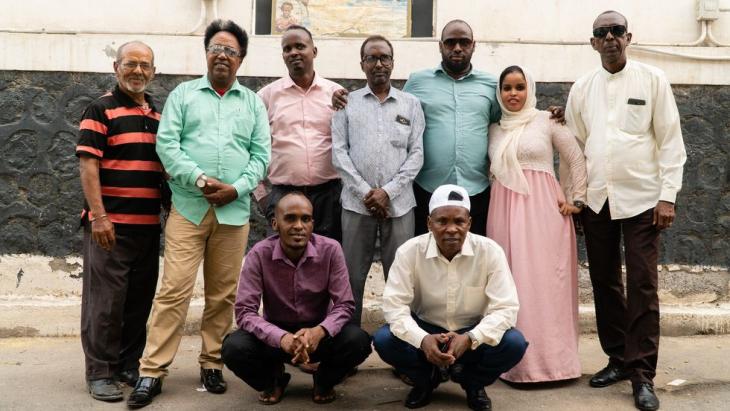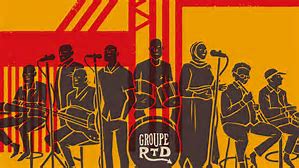Blending East African, Bollywood and Arab music traditions, Groupe RTD’s “The Dancing Devils of Djibouti” is not only a stunning album, it is also the first internationally-released recording of music from this small and isolated country.
By Richard Marcus

The Dancing Devils of Djibouti is the latest album from the Ostinato Record label to explore East African music. In a previous release, Sweet as Broken Dates, they tapped into the rich musical tradition of Somalia before it descended into chaos and war. With this album, they look at music drawn from the same cultural fount, as prior to independence, Djibouti was known as French Somaliland.
Djibouti is a tiny country bordered by Somalia, Eritrea and Ethiopia and situated at the mouth of the Red Sea and the beginning of the Indian Ocean. Since it gained independence from France in 1977, the country has been under one-party rule. Everything, including the popular music industry, is state run. Bands are used to celebrate national holidays and other events which suit the government’s needs and mainly for propaganda purposes.
No foreigner has been allowed to work with any of Djibouti’s musicians in the four decades since independence. Ostinato Records entered into negotiations with Radiodiffusion Télévision Djibouti (RTD) to gain access to the national radio’s archives of recorded music in order to introduce the world to the region’s amazing music. Yet this isn’t that record.
A happy coincidence
Instead, by happy coincidence, they ended up recording the band whose music you hear on the album. After intense negotiations with Djibouti’s government, Ostinato were allowed three days to record Groupe RTD (the band normally used for ceremonial and official events) in the state radio/recording studio. The result is truly remarkable.

he music of Djibouti, especially the version played by Groupe RTD on this album, shows how the band’s sound is not only influenced by their geographical location – where India, Africa and the Middle East meet – but the world of music from the African diaspora as well: funk and jazz from the US and reggae from Jamaica being the most easily recognisable. However, the influence of neighbouring Somalia shouldn’t be underestimated either.
The band’s two leaders, saxophone player Mohamed Abdi Alto (his name was legally changed by adding Alto to it in recognition of his virtuoso playing) and guitarist Abdirazak Hagi Sufi were both part of Somalia’s thriving musical culture before coming to Djibouti. Aside from their wealth of musical experience, they bring their variety of musical influences with them. Alto honed his chops by listening to the likes of John Coltrane, while Sufi brings his reggae-influenced guitar work to the mix.
Like Somalia, vocal stylizations by both men and women are steeped in the traditions of Bollywood and the Middle East. You can hear this in the singing of both Asma Omar and Hassan Omar Houssein, the young lead vocalists of the band. Omar in particular has the tone of voice, intonation, and other vocal qualities we’ve come to expect in both popular and classical music from India and Pakistan.
Even more impressive is that six of the ten songs on the album were written by the young vocalists, with Omar writing the two chosen to lead off the album, “Buuraha U Dheer” (The Highest Mountain) and “Raga Kaan Ka’Eegtow” (You Are The One I Love).
Lilting vocals
Ironically, given their respective titles, you’d expect the second song to be the one more influenced by South East Asia, but the opposite is true. “Buuraha” has the rhythm and sound we’ve come to associate with Bollywood while “Raga” has a definite reggae/funk/soul feel to it. If you’re not accustomed to the slightly nasal tone of female singers from this region it might take a bit for your ears to acclimatise to the sound of Omar’s voice. However, it fits in perfectly with the music and the band’s style.
“Raani”(The Queen), the album’s fourth track, is the first of Houssein’s contributions to the disc. While musically we’re still in the same realm, his vocals are more Middle East than India. They have a lilt to them which reminds me of singers I’ve heard from West Africa to Egypt and Algeria. Maybe it has to do with the rhythms of the language, but there is a distinctive air to these vocal stylizations which give them a flavour unique to their region.
What’s fascinating about this music is how much the vocal tracks, no matter who is singing, become an integral part of the overall sound. Unlike most popular or classical music for that matter, which we’re accustomed to hearing, where the band’s function is to support the singer, here the vocalist is another instrument contributing to the overall sound.
Perhaps this is the jazz influence on the band coming into play, as that genre is one of the few forms of popular music where the vocalist is not the sole point of the band. While vocals are certainly important to the band’s sound, here the instrumental music is given equal emphasis. The album’s fifth song, “Alto’s Interval”, a short instrumental named for the band’s leader, seems to stress that point.
Hopefully the first of many
It’s a great conversation between keyboards, guitar, percussion and saxophone that seems somehow to combine the variety of influences on the band into one two-minute song. Yet, in spite of the variety of sounds we hear in it and the rest of the album, we can’t escape the fact this album has more in common with the jazz fusion albums, along the lines of famed American groups such as Weather Report, which were released in the 1970s than anything else.
That is always supposing, of course, that those bands were based on the East Coast of Africa and steeped in Bollywood and Arab musical traditions. It’s these unique flavours that make the music of Groupe RTD and this album irresistible. Not only are the songs fun to listen to, they are also great to dance to. I defy anyone to listen to this album and be able to sit still.
The Dancing Devils of Djibouti is not only a great album; it also represents the first internationally-released recording of music from this small and isolated country. The sound is a revelation and we can only hope the recording represents the first in a long line of releases from these great musicians.
Source: Qantara.de


